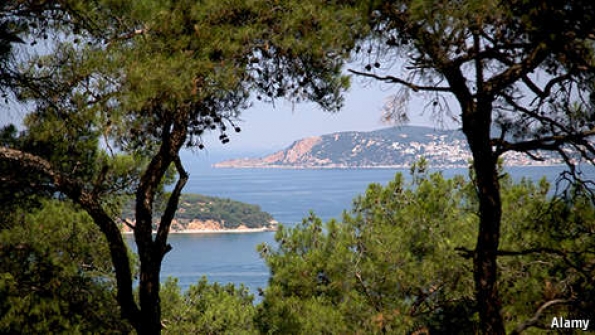Religion, ecology and academia Swapping stories, breaking boundaries
http://www.economist.com/blogs/erasmus/2015/06/religion-ecology-and-academia
Jun 12th 2015, 14:20 BY B.C. | HEYBELIADA ISLAND, TURKEY

LIBERAL-ARTS academics are not highly esteemed by mainstream America, especially if they are liberal in another sense. They are paid much less than management consultants or corporate lawyers, even though they are probably just as brainy, and they inhabit a world where, as Henry Kissinger may have said, the interpersonal politics are vicious because the stakes are small.
And within that rather embattled subculture, there is a smaller sub-subculture, that of liberal academics who take religion seriously, either because they profess one themselves or because they respect religion as a source of meaning and identity in the societies they study, be it as historians, sociologists or critics of art or literature. (On most campuses, these faith-minded scholars are on the defensive; in a world where Saudi bloggers are being flogged and French cartoonists massacred, many a scholar would consider the matter settled by the Roman poet Lucretius, who wrote that "religion has led to such a mass of evils..."

Then let's meet another hard-pressed minority, the leaders of Turkey's small Christian community. Just like religion-oriented scholars, those clerics serve as guardians of a great cultural inheritance but they get little recognition from the society around them. The Patriarchate of Constantinople, a spiritual institution which goes back at least 17 centuries, enjoys international prestige because of its "primacy of honour" within eastern Christianity and its commitment to the environment, but its local activities are circumscribed; it cannot build new churches or educate future clergy. Only the Patriarch is allowed to wear his clerical garb in public; his fellow bishops usually wear black suits.
For three days this week, these two worlds came together at a gathering organised by the Patriarchate and Southern New Hampshire University: scholars and communicators, mostly of a liberal or radical bent but at least open to the importance of faith, plus Patriarch Bartholomew I and some of the clergy and theologians who serve under him. It happened on a pine-covered, seagull-infested island near Istanbul (known as Heybeliada in Turkish, Halki in Greek, see picture) where the buildings of an old Patriarchal seminary still function as a tiny monastery.
more at link
